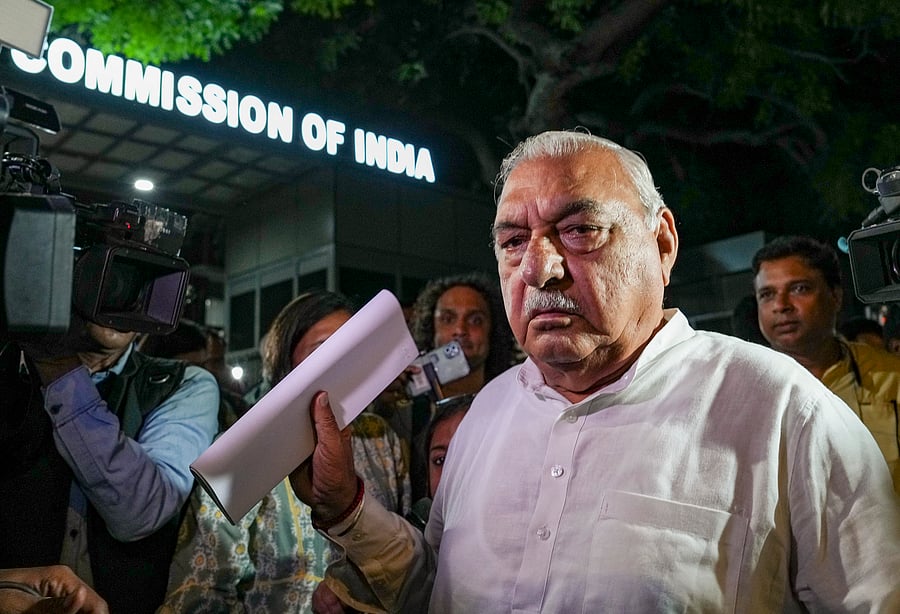
Congress leader Bhupinder Singh Hooda
Credit: PTI photo
New Delhi: Bhupinder Singh Hooda has managed one thing that Congress satraps Ashok Gehlot, Bhupesh Baghel and Kamal Nath could not do in the recent past — to continue as the Leader of the Opposition even after a hattrick of electoral setbacks in Haryana.
Factionalism and one-upmanship had cost governments for Gehlot in Rajasthan, Baghel in Chhattisgarh and Kamal Nath in Madhya Pradesh in late 2023 and they paid the price with a diminished say in their state units, though not relegated to the margins.
These three leaders did not lose like Hooda, yet they could not convince the high command to appoint their loyalists in key posts in the state units.
On the other hand, the Jat strongman ensured that only a man of his approval – Rao Narender Singh, a former minister who lost the last three Assembly polls – became the state president.
Even though he was a compromise candidate of his present detractors when they all ganged up against Bhajan Lal to deny him chief ministership in 2005, Hooda has since then consolidated his grip.
This is despite his inability to win a majority for Congress on its own in 2009, when defections helped the party form a government, or later.
After the Haryana electoral debacle in October last year, it took 11 months and 20 days for the Congress to select a Legislature Party Leader, who will become the LoP, and a new state president, as Hooda’s detractors saw a window of opportunity to clip his wings in a state where he has been the last word for Congress for two decades now.
Within 24 hours of the results that restricted Congress to 37 seats in the Assembly of 90 and gave the BJP a decisive majority, Hooda made the first move to pre-empt his opponents — around 30 of the 37 Congress MLAs assembled “informally” at his Delhi residence to send a message to the leadership against any “misadventure”.
Even before the elections, Hooda had ensured that he would have enough support in the legislature party by restricting the number of candidates favoured by his in-house opponents.
Hooda ran a campaign, sidelining leaders like Kumari Selja, a Dalit, Randeep Singh Surjewala and Birender Singh, both Jats, and Captain Ajay Yadav, an OBC. The voting day saw consolidation of non-Jats against the Congress and the results were there to see.
Having “snatched defeat from the jaws of victory”, as a senior Congress leader put it, the party appeared headed for an overhaul after the Assembly polls but it wasn’t easy.
Since 2007, the Haryana Congress unit has been headed by a Dalit.
Phoolchand Mallana had succeeded Bhajan Lal in 2007 while Ashok Tanwar replaced him in 2014. Selja assumed the presidency in 2019 only to be replaced by Udai Bhan, a Hooda loyalist, in 2022. All these years, Hooda, a Jat, headed the legislature party.
The eight years when Tanwar and Selja helmed the party in Haryana, Hooda played the non-cooperation card, making it difficult for them to function even as he failed to get Jat voters back to the Congress fold.
In recent times, the party has been looking at a new caste combination, with the leadership moving away from Jat-Dalit to Jat-OBC.
The new thinking aligns with Rahul Gandhi’s social justice plank with a focus on OBCs, who account for 28.3% of Haryana’s population as per the 2011 Census, though unofficial projections now put it at around 40%. Jats constitute 25% and Dalits 20.17% in the state.
The rival BJP had set the template in 2014 by choosing a Brahmin, ML Khattar, to be chief minister and replacing him with an OBC, Nayab Singh Saini. Now, the Congress had to follow suit, but it could not ignore Hooda.
Months of skillful negotiations by the party’s state in-charge BK Hariprasad finally led to a settlement that made most of them happy. The Congress leadership cleared Hooda as legislature party leader and Rao Narender Singh, an OBC Yadav, as state president.
By choosing Narender Singh, the party has decided to replace its Jat-Dalit formula with the Jat-OBC mix. Congress sources said the choice of Singh will also counter the BJP’s playbook of choosing OBC leader Saini as the CM.
From Surjewala to Selja to Birender Singh, all welcomed the new state president but Captain Ajay Yadav felt otherwise, as he raked up a corruption case against the new chief.
Compared to other contenders such as Chiranjeev Rao, son of Ajay Yadav, and Rao Dham Singh, Narender Singh is considered “closer” to Hooda and “more neutral” in party affairs.
While some see the appointments as having a Hooda stamp, a section in the party believes it has also sent a message for the veteran Haryanvi.
This section points to the delay in clearing Hooda’s name, claiming that the party was signalling that it is unwilling to play fully to his tunes.
What works in favour of Hooda is that he has systematically stymied competition against him and ran the party without a grassroots organisation, which has been electorally disastrous for the Congress.
The party couldn’t wish him away, as he remained the only leader with resources to run the party amid his growing stature in his community.
The question now is what tricks Hooda has up his sleeves, which he did not have in the past 10 years, to bring the Congress back to power in Haryana and to ensure that his son, Deepender Hooda, an MP, takes up his place.
